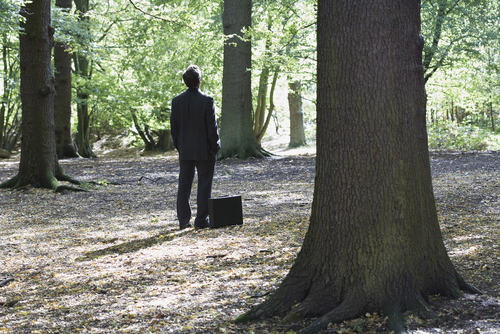An inconvenient God:
If God were made-to-order, like something you can buy on the Internet, what kind of God would we pick?
In our modern society, everything is available at our fingertips, so we would probably want a God that makes everything comfortable for us — a convenient God, one who gets us a better job, helps us find a parking place and, when we hurt ourselves, kisses it and makes it better.
A convenient God is a wish-fulfillment God.
That sounds nice, but is that the kind of God we encounter in our lives? Unfortunately, no. While we live in a convenient world, the God who shares our journey is an inconvenient God. We are thrown into rough situations, and our God makes demands on us, such as the Ten Commandments and the Golden Rule.
And the correct response is an inconvenient prayer: “Thy will,” not my will, “be done.”
Therefore, instead of creating a fantasy vision of what a perfect world would be, suppose we start with the real world and ask, in light of its rocky paths, what kind of God is present here? And what divine purpose is served by throwing us into such a world?
***
Real life is filled with drama.
It has ups and downs, loves and losses, triumphs and failures, days we rise to our best and times we fall to our worst. Our lives are like obstacle courses or quests where pits must be avoided and dragons slain.
What could possibly be the purpose of such lives? Any good parent knows. Any good coach knows. Readers of quest tales know. We do not grow from luxury. A convenient God would, like an overprotective parent, save us from learning life’s lessons.
The purpose of our lives is not just ease or pure pleasure or wish fulfillment. As I was told in prayer, “The purpose of life is not to sit in the lap of luxury.” Why not? Wouldn’t that be a great life, one a loving God would want to give us?
Well, ask yourself, would you want your child, at a young age, to win a billion-dollar lottery, to be able to buy whatever and whomever the darling desires, to live in a protective bubble that would keep disease and hurt out? Would that even be a life?
I was told, “Immersion in the world — with its causal networks, its guilty resistance — is necessary for growth. One needs a hard reality to work against. Otherwise, nothing would be serious.”
We grow from adversity, from challenges. Sometimes we learn more from failing than from succeeding. My colleague, the economist Kenneth Boulding, used to say, “Nothing succeeds like failure.” It is failure, he would say, that tells us where the edge of the cliff is.
As a drama, life has a meaning, shaped by how we cope with the ups and downs, how we deal with our own mistakes and the cruelties inflicted on us, and yet remain open to love and hope.
***
When my wife and I got married, we included the 23rd Psalm in the ceremony. While it is usually reserved for funerals, we knew that all of life is a Valley of the Shadow of Death. But throughout it all, God stands with us — whatever we face.
Why is there suffering? I was told in prayer, “Suffering is the law of growth.” We grow only through suffering. Even to love is to suffer.
We talk about a perfect God and expect him to be writing the perfect script, as if everything were programmed from the beginning. My sense is that God doesn’t lay out the story in advance, and have us walk through it like automatons.
We write our own script with God as co-author.
We create our own dramas, with God as partner — when we are paying attention. In prayer, I was told that the world is like an improvisational theater in which God is the director of players who aren’t listening.
A “perfect” world may not even be desirable. Imagine a world without suffering, where no matter what we did, everything turned up roses. It would be a world in which actions had no consequences. It would not be a real world at all, but a hologram world, and we would be hologram people.
Real life is lived in an inconvenient world in partnership with an inconvenient God.
It is a tough life in which God is not overprotective, but is always on our side. When we are in harmony with the divine and enjoying life’s bounty, God rejoices. When we are errant or in pain, God suffers.
Maybe the real world — inhabited by the flawed people that we are — is not convenient for God either. God is part of our drama and we are part of God’s. We are in this together.
I'd love to hear your thoughts on this piece
An Inconvenient God was first published by Tulsa World in 2016.
